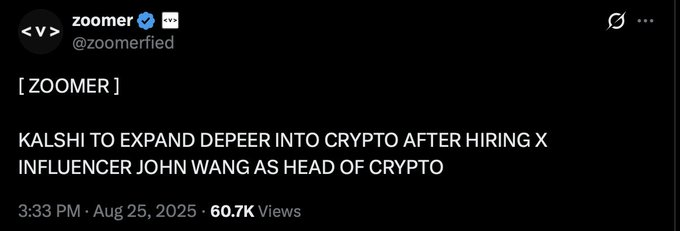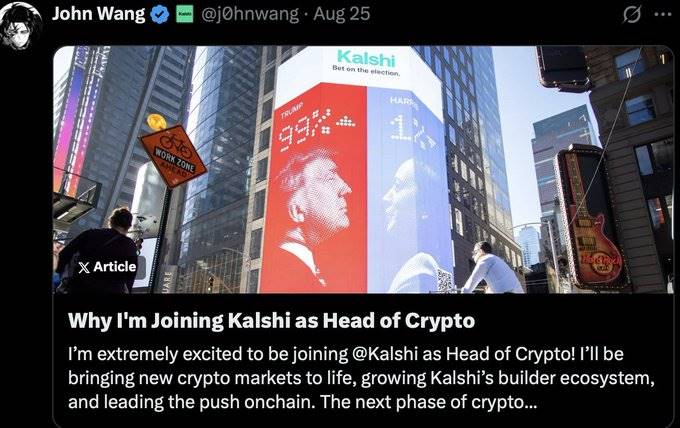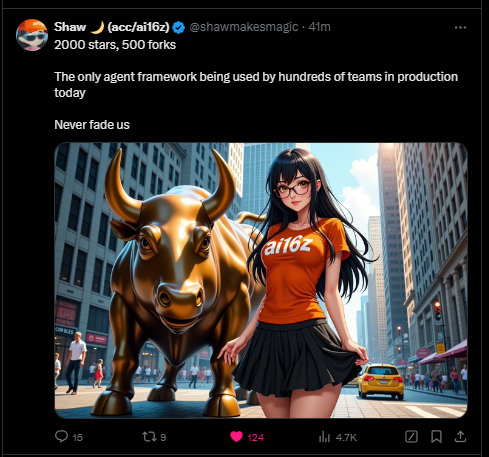It was a masterclass in modern psychological tactics.
I shouldn't have written this post; it's just too much information—which, frankly, is my ultimate skill. But whatever, let's dive into crypto marketing: a masterclass in psychological warfare.
If you don't know what psyops are, you've been manipulated your entire adult life.
Welcome to the Meme Wars.

Case 1: Kalshi enters the crypto market
Let's talk about @Kalshi first. This isn't FUD, I actually admire their execution. This is just my personal opinion, not hard evidence.
After memecoin’s popularity faded, prediction markets began to gain traction. Some influencers began pushing this narrative, one of whom was @j0hnwang.
Prediction markets are indeed fairer than memecoin. Memecoin is a brutal "1 vs. 1,000" game, while prediction markets at least make the odds more even. But let's be honest, crypto enthusiasts (degens) have a deep-seated love for coins and always have.
So the question is: how to capture market share from memecoins without issuing tokens, while simultaneously attacking dominant players like @Polymarket?
Answer: psychological warfare.
The following is the detailed process of the incident:
- John Wang had already signed with Kalshi before the official announcement.
- Over the next few months, engagement farms and researchers began building momentum for his account.
- When the signing was officially announced, the entire release process was carefully coordinated: news media, influencers, and "research" pages all reported the news - about the signing of a KOL.

This was seen as a landmark event, as if Kalshi had just poached a senior executive from Google or Apple.
It was a simple yet brilliant piece of psychological warfare: turning a personnel change into a full-scale marketing campaign.
Kalshi not only entered the crypto space, they made it look like a paradigm shift.
They paid these websites, researchers, and influencers to talk about the announcement. The hiring created a stir. Kalshi was officially entering the cryptocurrency market. It was being treated like a FAANG stock.
A very simple but effective psychological tactic: they carefully planned the announcement and turned it into a big marketing campaign.

Case 2: ai16z's Flywheel Effect
Next, let’s talk about ai16z.
This move was a stroke of genius, and for a time, it gave people (myself included) real hope for the future of crypto and AI.
Here’s how they do it:
- They launched a meme DAO around the concept of "tokenizing a16z (a famous venture capital giant)."
- Marc Andreessen (one of the founders of a16z) personally participated in the interaction, giving authority to this meme.
- In an instant, the entire industry's attention was focused on this "new AI fund."
Then, they launched their product: the Eliza AI agent.
It instantly became the number one platform on GitHub. The timing was perfect. The hype was unstoppable.

But what's the reality? Technically, it's just a wrapper around GPT. Simply put, it connects the existing Large Language Model (LLM) API to a front-end interface. There's nothing revolutionary about it.
But does anyone mind? Hardly. The product works, the vibe is there, and that's enough.
The key to psychological tactics lies not only in technique but also in narrative.
Being a member of the ai16z DAO became a status symbol. Like wearing a Rolex in its early days, being an “ai16z partner” meant you were special. It attracted elite university developers and deep-pocketed believers.
The DAO reached a market capitalization of $2.5 billion (with laughably thin liquidity). A flywheel effect formed: hype attracted liquidity, liquidity attracted investors, and investors created more hype.
But then the question becomes: how do you cash out without destroying the price chart?
The answer is: you don’t cash out directly. Instead, ai16z “sold” their technology to other AI crypto projects and received up to 10% of the token in a pre-token supply agreement in exchange for market support.
The result? A wave of half-baked AI projects that were fostered, hyped, and then quickly sold off.

Eventually, the psychological tactics worked. Liquidity was drained. And now, ai16z is plotting his next comeback.
The Essence of Encrypted Psychological Warfare
Here comes the point: no routine can be reused.
Once people see through the gimmick, it's gone. They quickly move on to the next shiny new thing. This is why so many projects keep recycling the same old clichés:
- Airdrops
- Roadmaps
- Buybacks
- Flywheels
- Tokenomics
If you hear these words, it means the team hasn't realized how the market has changed. Marketing today is no longer just empty announcements. In this market, only products that actually ship matter.
Welcome to the Meme Wars
Crypto marketing today isn't just advertising, it's war.
Narratives are weapons. Interactions are ammunition. Every announcement, collaboration, or dispute is a battle for mindshare.
The winners aren’t just the projects that sell the technology, but the teams that can run a coordinated psychological campaign : telling stories, creating memes, and developing strategies that make their target users willing to believe their narratives.
Of course, not all projects follow the same rules.
If you want to capture market share in this industry, you must arm yourself. Assemble your team like a Roman warlord preparing for conquest.
Because in crypto, it’s a war.
"Si vis pacem, para bellum."
If you want peace, prepare for war.

Fight your competitors, not your community. Your true allies are the ones who support you.








